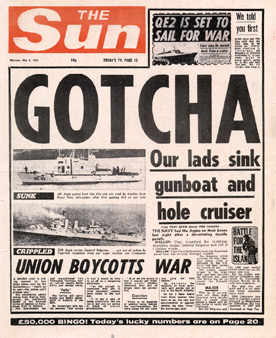Why SEO Matters in a World of Online Journalism
 Content
Content It’s understandable that revered journalists like Charlie Brooker and Gene Weingarten are upset about how search engine optimisation (SEO) is putting an end to journalism as we know it. It makes the job a little harder indeed; try writing and eloquent piece of dialogue about something that’s probably way over your head, all the while trying to throw in a bunch of hot keywords in the specific ‘F-pattern’ placement the lazy-eyed reader will typically use to scan. But, contrary to popular belief, quality editorial does not need to be compromised in order to improve your SEO rankings. In fact, quality content is key.
“For years newspapers have routinely jazzed up dull print articles with photographs of attractive female stars (you know the sort of thing: a giant snap of Keira Knightley doing her Atonement wet-T-shirt routine to illustrate a report about the state of Britain’s fountain manufacturers). But at least in those instances the actual text of the article itself survived unscathed. There’s something uniquely demented about slotting specific words and phrases into a piece simply to con people into reading it. Why bother writing a news article at all? Why not just scan in a few naked photos and have done with it?” – Charlie Brooker, The Guardian
The idea that simply slotting specific words into an article can cons readers is demented, actually Mr. Brooker, especially for the Web. We live in an age of efficiency where shoppers would rather use self-checkouts even when the poor Tesco’s Sales Assistant is stood standing at the till with nothing to do, we buy pre-packaged rice to shave maybe 10 minutes off the usual 15 minutes it takes to boil it. Of course we want to put a single word into a search engine and the answer we’re looking for be laid out in front of us. Our everyday lives have become so distant and time costly that searching for a quick answer in a search engine is the easiest and most practical thing in the world, it makes perfect sense that journalists now need to pander to that specific need to make their pieces relevant. So how do you do this without compromising your editorial? It’s relatively simple.
 Headlines
Headlines
Headlines are important. It’s got to be eye catching but relevant. Take The Sun’s infamous ‘Gotcha’ headline as an example; during the Falklands War the British Navy controversially sunk the General Belgrano, an Argentinean cruiser, cue an arguably inappropriate headline from a boundary pushing publication. Now this is a typical headline from The Sun, like ‘Freddie Starr Ate My Hamster’ or ‘Up Yours Delores’, they’re blunt and usually a crude play on words, but would it work for a purely online audience? Probably not.
Stifling your creative juices somewhat for the sake of an informed headline is not the worst thing you’ll do and really, what is creativity without a challenge anyway? It used to be that making your headlines totally information rich would result in the best rankings, but in a ever-growing social sphere where sites like Buzzfeed reign supreme, the best idea is to try to marry emotion and SEO. Make sure the title of your piece is rich in informative keywords but also contains something that makes the reader want to click through to your content. Once you think you’ve got it, test it out, pop it into Google and see what other articles come up relating to what you’ve typed.

Keywords
Yes, journalism can be a pretty face that fronts a complicated maze of search engine techniques, but done well it not only compels the reader, but also provides an extensive list of keywords that helps Google sort related articles into what it is you’re looking for. It’s the best and most well organised interactive library in the world and journalists have an important role in adhering to this process. Here are some helpful tips when you’re writing your article or blog post:
- Abbreviate, but always write the full version of your phrase at least once.
- Leading on from that, keywords aren’t just single words, they’re phrases too.
- Don’t duplicate your keywords.
- Use tools to see what type of things your readership are searching for.
- Don’t overdo your keywords.
Content
Quality content is definitely key and contrary to a lot of journalist’s beliefs, you don’t have to compromise quality editorial for search engine rankings. Any journalist worth their salt knows about the ‘Five Ws (and an H)’ and the ‘Inverted Pyramid’. Get to the ‘who, what, why, when, where, how’ fairly sharpish and make sure you structure your post with this at the top of your inverted pyramid. This is important not only so your readers know where they’re at, but also so those search engine robots can tell what the rest of your article might be about and sort its relevance in Google.
This is an SEO blog so I’m sure those reading are aware how important links are, but It’s worth noting that slotting some useful links throughout your content will act as a vote of confidence and might even earn you a link back in return. If you’ve writing on a news story, link back to a page that gives background information. If you talking about celebrity gossip, link to another site that has talked about similarly relevant content. While you do this, make sure your ‘Anchor Text’ is a keyword that links to that relevant content, as search engines will look into this a well.
This world is a digital one, and it becomes more and more so everyday. Attention spans are lessening and our thirst for interesting online content grows by the minute; SEO and journalism need to work hand in hand in order to deliver to a generations demands. Those perusing careers in online journalism needn’t put down their extensive vocabulary, but instead pair it intelligently with what is needed in order to make their content relevant to those searching for it.


